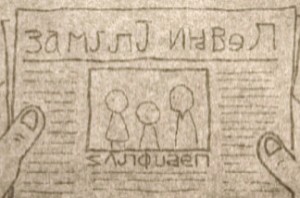Posts Tagged as "Oliver Sacks"
Is multi-sensory learning hardwired into our humanity?
Monday, September 20th, 2010I was really struck by Oliver Sacks‘s description of a recovering stroke victim in his June 28th New Yorker article, A Man of Letters.
Sacks describes a letter he received from writer Howard Engel in early 2002. One morning, Howard woke up feeling fine. However, the newspaper now appeared to be printed in a foreign language.

After determining that what he was experiencing wasn’t actually a practical joke, Howard realized he had suffered a stroke. The diagnosis was “alexia sine agraphia”: Howard could still write just fine, but he couldn’t read.
The article insightfully explores how, even though we think reading and writing are part of one seamless whole, they actually involve very different neurological processes. But my favorite part of the article describes Howard’s rehabilitation, which involved keeping a journal of his life in the rehab hospital:
Occasionally, with unusual words or proper names, Howard might be unsure of their spelling—he could not “see” them in his mind’s eye, imagine them, any more than he could perceive them when they were printed before him. Lacking this internal imagery, he had to employ other strategies for spelling. The simplest of these, he found, was to write a word in the air with his finger, letting a motor act take the place of a sensory one.
Increasingly and often unconsciously, Howard started to move his hands as he read, tracing the outlines of words and sentences still unintelligible to his eyes. And most remarkable, his tongue, too, began to move as he read, tracing the shapes of letters on his teeth or on the roof of his mouth. This enabled him to read considerably faster… Thus, by an extraordinary metamodal, sensory-motor alchemy, Howard was replacing reading by a sort of writing. He was, in effect, reading with his tongue.
First, Howard’s determination to regain his ability to read, even through seemingly strange methods, is totally inspiring. But his experience also made me wonder if multi-sensory learning is hardwired into our humanity.
We’re socialized to learn primarily by sitting, listening, reading, and writing with a pen or pencil. Other ways of learning—through song, dance, movement, or writing words in the air with your finger, are frequently regarded as kids’ stuff.
Sure, it’s fine to rap about the multiplication tables, but rapping or singing to remember material isn’t encouraged in during medical or law school! Adults are supposed to learn quietly, politely—invisibly.
Or multi-sensory learning methods are viewed as a back-up plan—something to try when nothing else works, even though active, multi-sensory learning seems to work a lot better than the passive kind.
The relative ease with which Howard, in his late 60s or early 70s, found multi-sensory ways to read again—by tracing words in the air with his finger or moving his tongue as he read—suggests that the instinct to use all of our senses to learn is somehow essential to who we are as human beings.
Three months ago, I acted out what the different parts of the brain cell do with one of my students to help her remember. I still remember the roles of the dendrites, axon, and synapses. If it had been written on a flash card, I probably wouldn’t remember any of it.
What if multisensory learning is actually plan A, and it’s just been socialized out of us?
Image by Lev Yilmaz for NPR.
Related posts:
When in doubt, talk it out
Ana Reynales earns her BA at 82!!
Self-taught hero: Pearl Fryar
Comment on this post (7)






